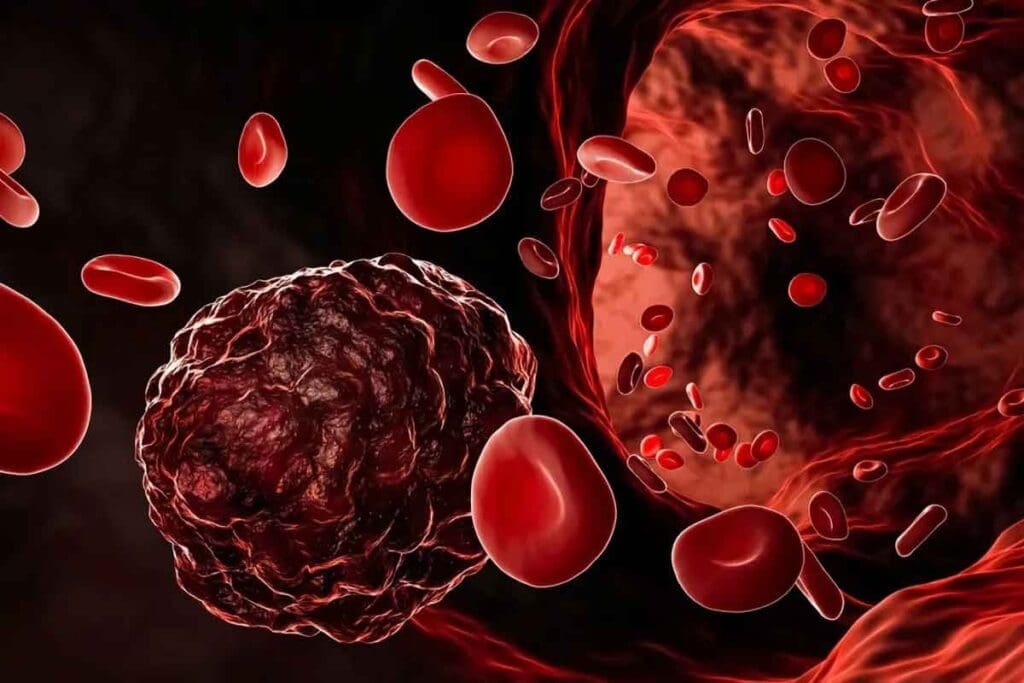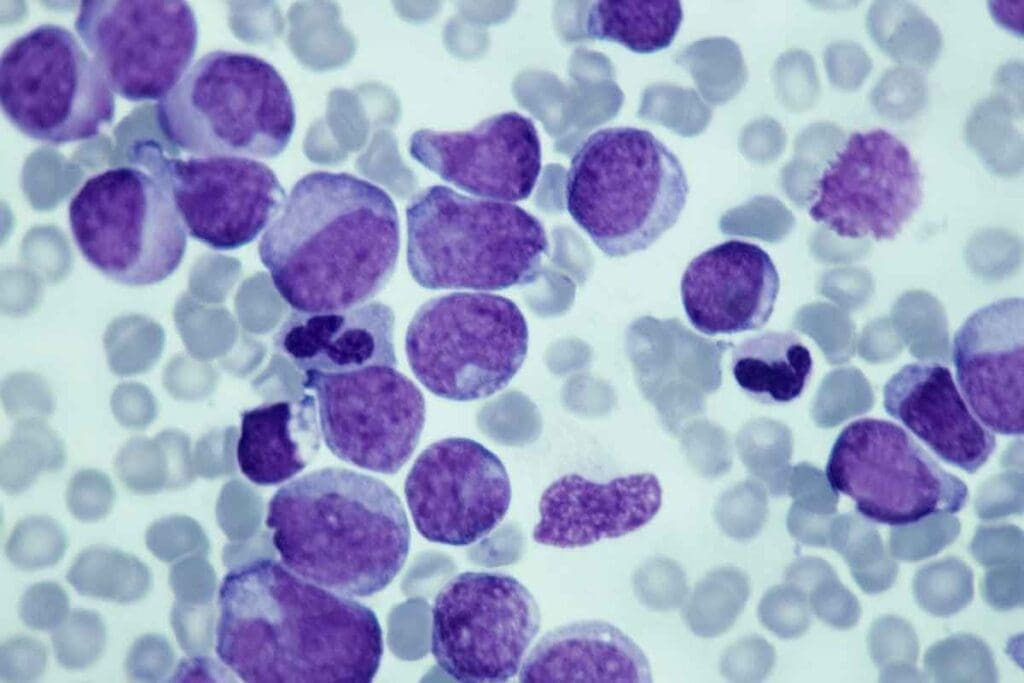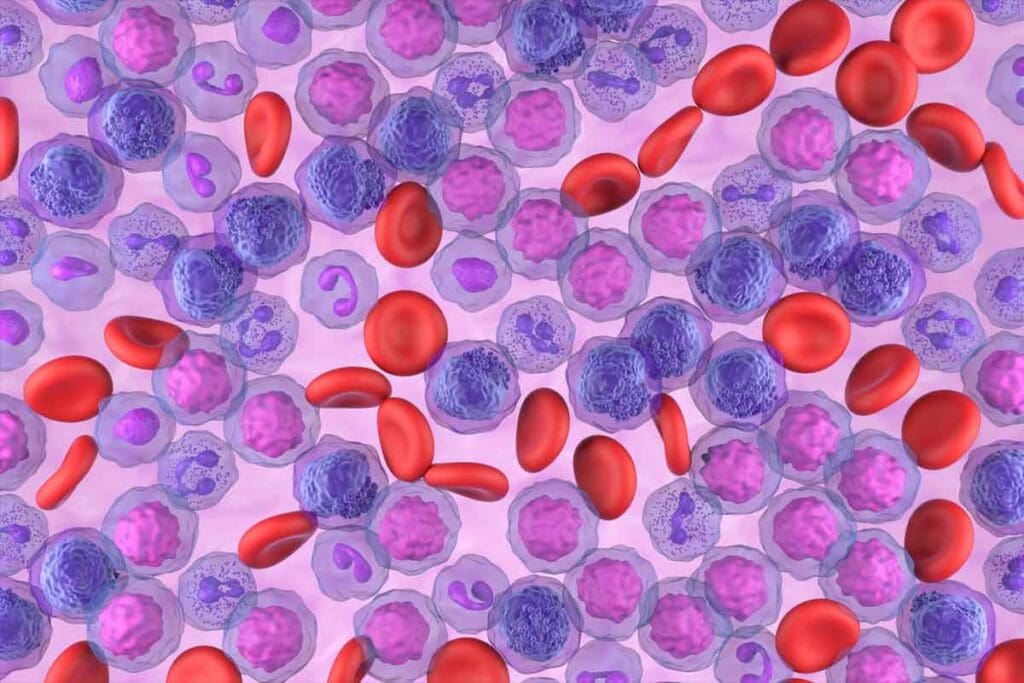Last Updated on November 17, 2025 by Ugurkan Demir
Leukemia is a cancer that affects blood-making tissues. It messes with the body’s immune defenses. It mainly hurts white blood cells, which fight off infections. At Liv Hospital, we explain how does leukemia affect the immune system and why understanding this connection is crucial for effective care.

Leukemia makes abnormal white blood cells. These cells either don’t grow up right or don’t work well. This makes it hard for the lymphatic system to fight off infections and other illnesses. We aim to give our patients the best care, using the latest medical standards from around the world.
Leukemia is a group of cancers that affect the blood and bone marrow. It’s important to understand its types and how they harm the immune system, mainly by affecting white blood cells.
There are four main types of leukemia. Each type has its own characteristics and effects on the body. Acute Lymphocytic Leukemia (ALL) is common in kids and involves fast-growing immature lymphocytes.
Acute Myeloid Leukemia (AML) is more common in adults. It causes the quick growth of abnormal myeloid cells, which help fight infections.
Chronic Lymphocytic Leukemia (CLL) mainly affects older adults. It progresses slowly, with mature lymphocytes building up in the blood, bone marrow, and lymphoid tissues. Chronic Myeloid Leukemia (CML) is characterized by the excessive growth of mature myeloid cells. It starts slowly but can become more aggressive.

White blood cells, or leukocytes, are key to the immune system. They defend the body against infections and foreign substances. They are made in the bone marrow and travel through the body via the bloodstream and lymphatic system.
Normal immune function depends on a balance between different white blood cells. These include neutrophils, lymphocytes, monocytes, eosinophils, and basophils. Each type has its own role.
In a healthy person, white blood cells work together to fight off pathogens. But in leukemia, abnormal white blood cells disrupt this balance. This makes it hard for the immune system to fight infections well.
Leukemia impacts the immune system by creating abnormal white blood cells. These cells don’t work right and fill up the bone marrow. This makes it hard for the immune system to fight off infections.
Leukemia causes white blood cells to grow out of control. These cells are key for fighting off infections. But in leukemia, they don’t grow right and can’t fight infections well.
Abnormal white blood cells also take up space in the bone marrow. This means there’s less room for healthy cells. This can lead to a lack of other important blood cells.

White blood cells need to mature to work properly. In leukemia, this process is messed up. This means the immune system can’t fight off infections well.
“The presence of leukemic cells in the bone marrow can lead to a suppression of normal hematopoiesis, resulting in a decrease in the production of normal blood cells.”
-Professionals note
Leukemic cells take over the bone marrow, pushing out healthy cells. This messes up the production of blood cells. It can cause anemia, bleeding problems, and make infections more likely.
| Effect of Leukemia | Impact on the Immune System |
| Production of Abnormal White Blood Cells | Impaired immune response due to dysfunctional cells |
| Impaired Maturation of Immune Cells | Weakened immune response |
| Bone Marrow Infiltration | Displacement of healthy cells, leading to various complications |
Understanding these mechanisms helps us see how leukemia affects the immune system. It shows why we need specific treatments to help the immune system work better.
The lymphatic system is key to our immune health. It helps filter out harmful invaders and starts immune responses. This system includes lymph nodes, vessels, and organs like the spleen and tonsils.
The lymphatic system has a network of vessels that move lymph fluid. This fluid has lymphocytes, important white blood cells for fighting off infections. Lymph nodes filter this fluid, catching pathogens and starting immune actions.
The spleen also plays a big role. It cleans the blood by removing old or damaged red blood cells. It also houses immune cells like macrophages and dendritic cells.
For our immune system to work well, the lymphatic system must function properly. It not only removes harmful invaders but also helps immune cells grow and work.
Leukemia can harm the lymphatic system. Leukemia cells can fill up lymph nodes and organs, making it hard for them to work properly. This can cause lymphadenopathy, or swollen lymph nodes, in some cases.
When leukemia cells block lymphatic pathways, our immune system can’t fight off infections as well. This makes us more likely to get sick. Also, leukemia cells taking over the lymphatic system can push out healthy immune cells. This makes it tough for our bodies to fight off diseases.
It’s important to know the difference between the immune system and the lymphatic system for good health. They work together but each has its own job to keep us healthy.
The immune system fights off infections and diseases. It has cells, tissues, and organs that team up to find and get rid of harmful invaders. The lymphatic system, on the other hand, is a network that helps move lymph fluid around the body. It helps filter out bad stuff and supports the immune system.
Key functions of the immune system include:
The lymphatic system’s primary roles are:
The immune system and lymphatic system team up to keep us healthy. The lymphatic system moves immune cells and helps get rid of bad stuff. The immune system fights off infections. Together, they protect us from diseases.
“The lymphatic system is not just a passive drainage system; it is an active participant in the immune response, working in tandem with the immune system to defend the body against infection and disease.”
-Specialists highlight
To show how these systems work together, here’s a table:
| System | Primary Function | Key Components |
| Immune System | Defend against infections and diseases | T cells, B cells, antibodies |
| Lymphatic System | Transport lymph fluid, filter pathogens | Lymph nodes, lymph vessels, spleen |
For more info on how leukemia affects the immune system, check out MyLeukemiaTeam.
Leukemia types affect the immune system in different ways, causing specific immune problems. We will look at how different leukemias lead to unique immune issues.
Acute leukemias, like acute lymphoblastic leukemia (ALL) and acute myeloid leukemia (AML), cause fast immune weakening. This happens because cancer cells grow quickly, taking over the bone marrow where immune cells are made.
People with acute leukemias get sick easily because their immune system is weak. They need quick medical help to fight the leukemia and its effects on the immune system.
Chronic lymphocytic leukemia (CLL) mainly affects antibody production, leading to a lack of antibodies. CLL cells build up in lymphoid tissues, bone marrow, and blood, harming B cells’ function.
This harm makes CLL patients more likely to get infections, like those from encapsulated bacteria. The lack of antibodies makes fighting infections harder for these patients.
Myeloid leukemias, such as chronic myeloid leukemia (CML) and AML, often cause neutrophil dysfunction. The abnormal cells in myeloid leukemias can damage neutrophils, which are key in fighting infections.
Neutrophil dysfunction in myeloid leukemias raises the risk of serious infections. These infections can be deadly if not treated right away.
In summary, the type of leukemia greatly affects the immune deficiency it causes. Knowing these differences is key to finding effective treatments for leukemia and its impact on the immune system.
Leukemia cells create a special environment that helps them avoid being detected by the immune system. This environment is made possible by cytokine imbalances. It makes it hard for the immune system to fight leukemia effectively.
Leukemia cells have ways to avoid being found by the immune system. They use checkpoint molecules to slow down immune cells. For example, PD-L1 on leukemia cells can stop T cells from working right.
“Cancer cells’ ability to hide from the immune system is a key feature of cancer,” say experts. This hiding act is important for leukemia to grow, as it lets cancer cells multiply without being attacked by the immune system.
Cytokines are important for the immune system to work. In leukemia, cytokine levels get out of balance, creating a suppressive environment. For instance, too much TGF-β and IL-10 can quiet down immune cells. Not enough IL-12 makes it harder for the immune system to fight.
It’s key to understand these processes to create new treatments. Treatments that can fix the immune system’s balance and help it fight leukemia better.
Leukemia patients struggle with immune problems, making them more likely to get sick. Their immune system, which fights off germs, doesn’t work right. This makes them very vulnerable.
Immune dysfunction in leukemia patients can lead to a range of clinical implications, including increased susceptibility to infections. As noted by a study, “Infections are a major cause of morbidity and mortality in patients with leukemia, particularly during periods of intense immunosuppression.”
Leukemia patients get sick more easily because their immune systems are weak. Their bone marrow makes bad white blood cells, pushing out the good ones. This makes them very vulnerable to infections.
Preventive measures are key to fighting off infections. This includes using antibiotics, getting vaccinated, and staying away from germs.
Leukemia patients also face risks of other illnesses and problems. These can come from the disease itself or from treatments.
For example, cytokine imbalances can cause serious issues, like graft-versus-host disease in bone marrow transplant patients. Handling these problems needs a detailed plan, including constant checks and quick action.
To lessen the risks of immune problems, several steps can be taken. These include:
By using these methods, doctors can lower the chance of infections and other problems in leukemia patients. This helps improve their health and life quality.
Leukemia affects the immune system in many ways. It produces abnormal white blood cells and hampers the maturation and function of immune cells. It also invades the bone marrow.
The lymphatic system is key to our immunity. Leukemia disrupts it, making the immune response harder.
Leukemia types like acute and chronic have different impacts on the immune system. This leads to various immune deficiencies. It’s vital to understand how leukemia, the immune system, and the lymphatic system interact. This knowledge helps in creating better treatment plans.
The immune and lymphatic systems protect us from infections and diseases. In leukemia patients, these systems are weakened. This makes them more prone to infections and other illnesses.
Healthcare providers can take steps to prevent these issues. They can help improve patient outcomes by managing these risks.
As we learn more about leukemia, we can make treatments better. This will help care for patients with leukemia more effectively.
No, they are not the same, but closely related. The lymphatic system helps defend the body against infection and disease. The immune system uses cells, tissues, and organs to fight off pathogens.
Leukemia harms the immune system by making abnormal white blood cells. This makes it harder for the body to fight off infections. The type of leukemia affects how much it weakens the immune system.
White blood cells are key in fighting off pathogens. Leukemia disrupts this by creating abnormal cells that can’t fight well.
The lymphatic system helps by filtering lymph fluid and storing lymphocytes. It aids in removing pathogens from the body. Leukemia can mess with these pathways, weakening immunity further.
Leukemia patients face a higher risk of infections and complications like sepsis and pneumonia. Using antimicrobial prophylaxis and immunoglobulin replacement can help reduce these risks.
Leukemia cells avoid being detected by changing the microenvironment and suppressing immune responses. They also produce substances that weaken the immune system. This lets them grow and survive, causing the disease to progress.
The immune system fights off pathogens, while the lymphatic system aids in this fight. They are different but work together to keep the body healthy.
Different leukemias, like acute lymphoblastic leukemia and chronic lymphocytic leukemia, impact the immune system differently. This leads to varying levels of immune suppression and infection risk.
Sánchez-Correa, B., Gayoso, I., Bergua, J. M., et al. (2012). Decreased expression of DNAM-1 on NK cells from acute myeloid leukemia patients. Immunology & Cell Biology, 90(1), 109-115. https://pubmed.ncbi.nlm.nih.gov/22266515/
Subscribe to our e-newsletter to stay informed about the latest innovations in the world of health and exclusive offers!